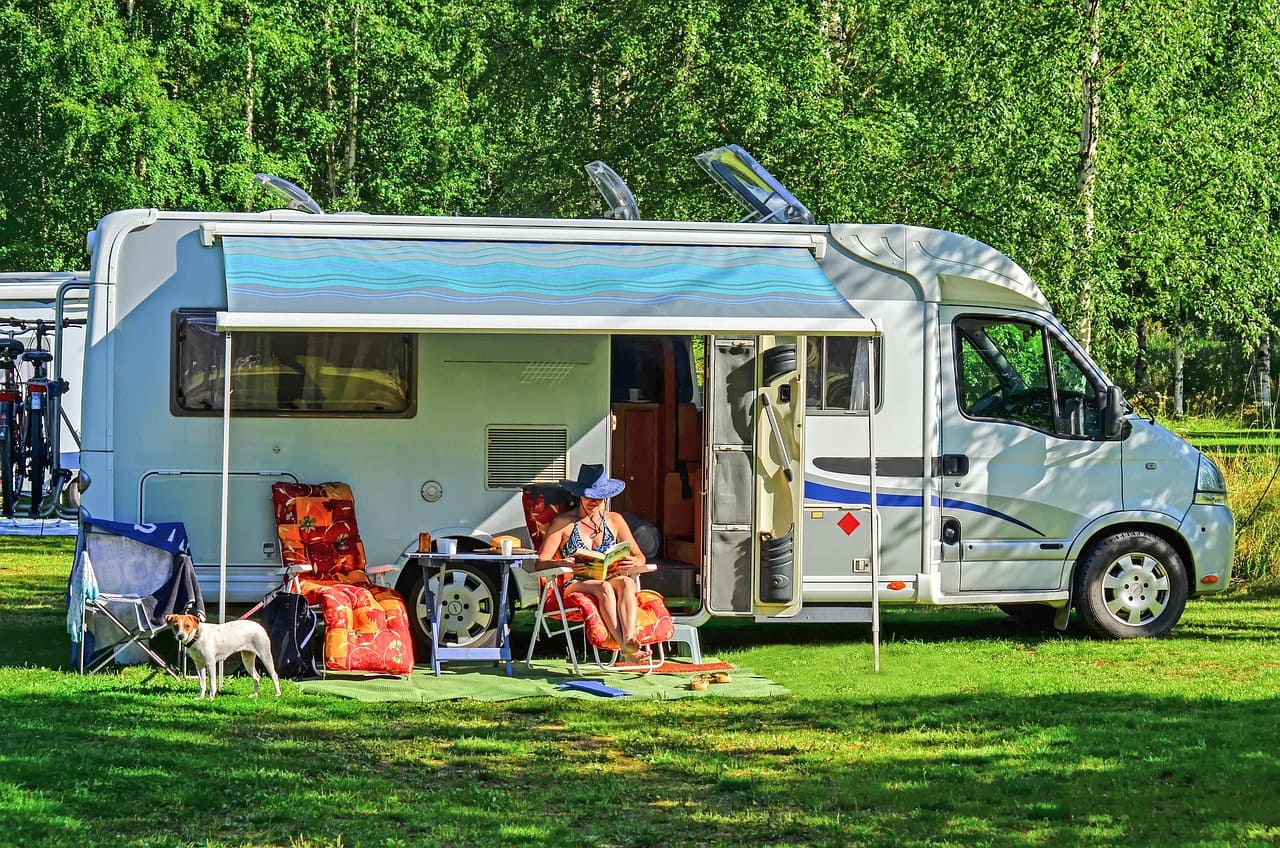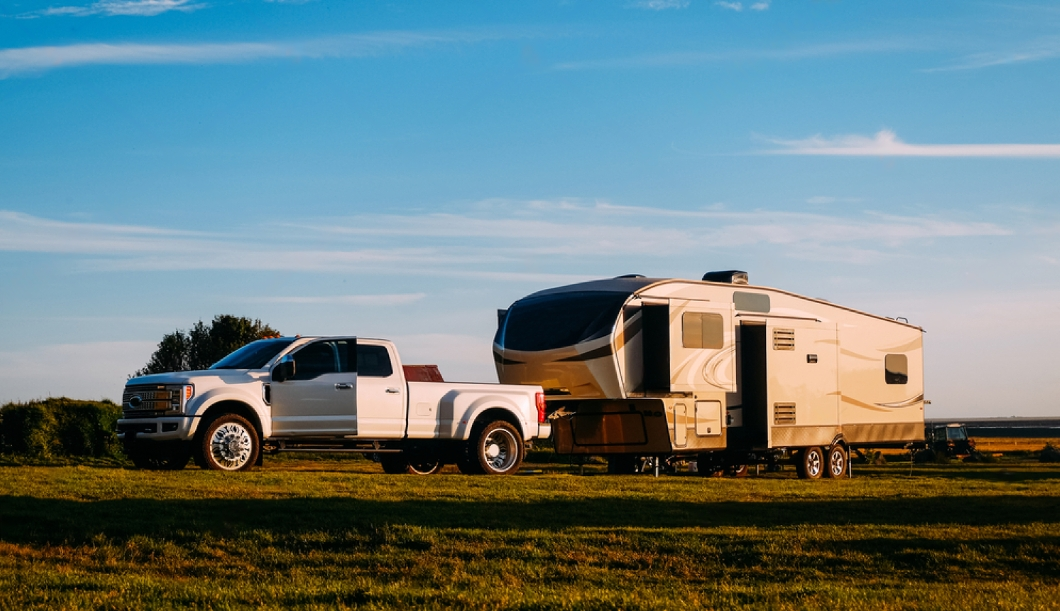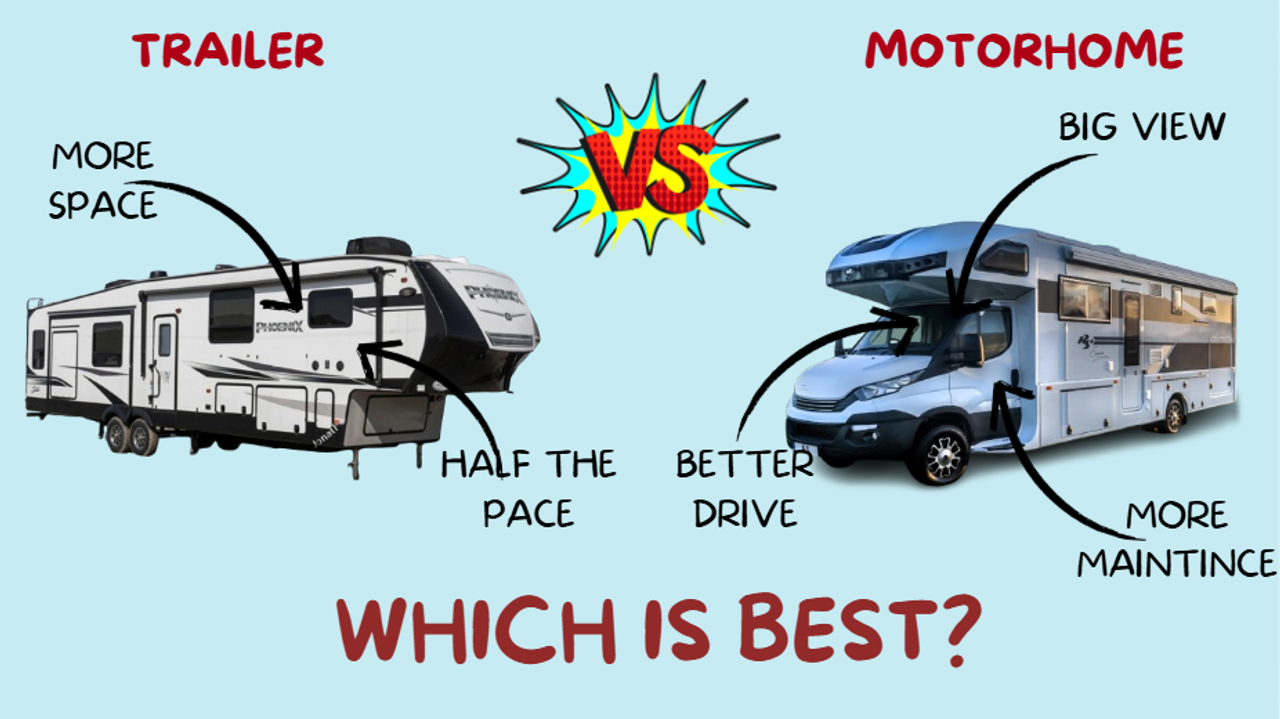Should You Buy an RV or a Camper Trailer?
For those seeking a more comfortable and enjoyable summer travel experience, recreational vehicles (RVs) and travel trailers offer a luxurious alternative to traditional tent camping. Whether planning a weekend getaway, exploring national parks, or embarking on an extended journey, these mobile accommodations enhance the overall travel experience.
Purchasing an RV or camper trailer is a significant investment. Therefore, prospective buyers should carefully weigh the advantages and disadvantages of each option before making a decision. This analysis will help ensure a purchase that aligns with individual travel needs and budgets.
Choosing between an RV and a trailer
The main difference between an RV and a trailer is simple: RVs have an engine, and trailers don't. This means trailers need a truck, SUV, or other vehicle to pull them, while RVs are ready to hit the road on their own. If you already have a vehicle capable of towing, a trailer might be a great option. If you want everything in one package, an RV is the way to go.
Travel trailer or motorhome: What's the difference?
"Travel trailer" is just another name for a camper, and "motorhome" is another name for an RV. So, the same rule applies: travel trailers don't have engines, but motor homes do. Because of this, motor homes are usually more expensive than travel trailers, though some really fancy trailers can cost more than basic motor homes. Let's take a closer look at what else sets them apart.
What's the difference between an RV and a camper?
"RV" stands for "recreational vehicle" and covers lots of different kinds of vehicles. Technically, a trailer is a type of RV, but that's not how most people use the term. In the United States, when people say "RV," they usually mean "motorhome." So, the key difference is that RVs (motor-homes) have their own engines and can be driven, while trailers need to be towed by a truck or other vehicle.
What is an RV (motorhome)?
Recreational vehicles (RVs), also known as motor homes, are self-propelled vehicles equipped with their own engines, eliminating the need for towing. These vehicles range in size from compact, van-like models to expansive motor homes capable of serving as semi-permanent or permanent residences. RVs are categorized into three classes based on size, generally offering more living space than trailers.
- Class A RVs: Resembling buses in design, Class A RVs represent the largest category, reaching lengths of up to 45 feet. These models often feature full kitchens, bathrooms, and expandable sections for increased living space when parked.
- Class B RVs: The smallest motorhome type, Class B RVs are typically built on van chassis and measure up to 24 feet in length. Despite their compact size, they provide comfortable accommodations for travel.
- Class C RVs: Occupying a middle ground in size and functionality between Class A and Class B RVs, Class C models exhibit the greatest size variation, ranging from 21 to 41 feet in length.
How much does it cost to purchase an RV?
The purchase price of an RV varies significantly depending on its class, floor plan, and type. Data indicates that RVs can cost upwards of $300,000. Generally, a new motorhome can be expected to cost around $100,000. Used motor homes offer a more affordable option; however, their prices vary even more widely than those of new models, similar to the used car market.

What is a camper or trailer?
The defining characteristic of a trailer is its lack of an engine, necessitating towing by another vehicle (including motor homes). Unlike self-propelled RVs or motor homes, trailers are known by a variety of terms, including:
- Trailers
- Campers
- Camper trailers
- Fifth-wheel trailers
- Pop-up campers
- Foldable campers
- Truck campers
- Camper shells
While some of these terms are used interchangeably, others, such as "truck campers," denote specific trailer types. The absence of an engine and associated driving safety features allows for a wide range of trailer types and sizes.
How much does it cost to purchase a camper trailer?
Trailers and campers generally offer a more cost-effective entry point than full motor homes. New trailers are typically available for under $50,000, with some of the most affordable options starting around $10,000.
Owning an RV: Advantages and disadvantages
Investing in an RV, or motorhome, offers a unique travel experience, but it's essential to consider both the advantages and disadvantages before making such a significant purchase.
The advantages of RV ownership
One of the most compelling benefits of owning an RV is convenience. The self-propelled nature of motorhomes eliminates the need for a separate towing vehicle (although many RV owners choose to tow a smaller car for local travel). This significantly simplifies setup and teardown at campsites compared to towing a trailer. RVs also typically offer more spacious living quarters, accommodating larger groups and facilitating comfortable travel for families or groups of friends. This extra space can also be great for entertaining fellow travelers.
Furthermore, RV ownership may offer potential tax advantages. Depending on the specific RV and individual circumstances, it may qualify as a second home under IRS regulations, potentially leading to tax deductions. Consult a tax professional for specific advice.
The disadvantages of RV ownership
Operating an RV can present challenges, even for experienced drivers. The sheer size of these vehicles can be intimidating, and it often takes time and practice to become comfortable maneuvering on highways and navigating into campsites.
However, the most significant drawback of RV ownership is the substantial cost. As previously discussed, new RVs often carry a six-figure price tag. While financing options are available, this level of investment requires careful financial planning.
The initial purchase price represents only a portion of the overall cost of ownership. Fuel consumption is a major expense, especially for larger RVs. While some RVs achieve better fuel economy than trucks or SUVs towing trailers, fuel costs remain a significant factor. The average RV achieves approximately 10 miles per gallon, though diesel models generally offer improved fuel efficiency. Ongoing expenses also include insurance and maintenance, which tend to be higher for RVs than for trailers.
Finally, parking and storage can be problematic. Many homeowners associations and local ordinances restrict long-term street parking of RVs, requiring owners to find alternative storage solutions for these large vehicles.
Owning a trailer: Advantages and disadvantages

Similar to RVs, trailers offer a unique set of advantages and disadvantages that prospective buyers should carefully consider.
The advantages of trailer ownership
One of the most significant advantages of camper trailers is their cost-effectiveness compared to motorhomes. Not only is the initial purchase price typically lower for a new trailer than a new motorhome, but the depreciation curve also differs significantly. Trailers tend to retain their value better than motorhomes, making used trailers an attractive option for budget-conscious buyers.
Beyond the lower acquisition cost, trailers generally require less maintenance and often result in lower expenses for insurance, parking, and campsite fees. Their smaller size also simplifies storage during the off-season, although larger fifth-wheel trailers can reach lengths of up to 40 feet.
The disadvantages of trailer ownership
While offering a more comfortable experience than tent camping, setting up a trailer, especially pop-up or foldable models, can present a learning curve. Trailers typically offer less living space and fewer amenities (such as air conditioning or fully functioning bathrooms) than comparable motorhomes.
A crucial consideration for prospective trailer owners is the need for a suitable towing vehicle. This could range from a heavy-duty truck for a fifth-wheel trailer to a vehicle equipped with a standard hitch for smaller trailers. While motorhomes are known for their fuel inefficiency, towing a trailer also impacts fuel economy, typically reducing gas mileage by 7 to 10 miles per gallon.
Which Should You Choose: RV or Camper?
Several key factors will guide the decision between purchasing an RV and a trailer:
- Frequency of Use: If you anticipate frequent, extended trips lasting weeks or longer, an RV might be the more suitable choice. For shorter excursions, such as weekend getaways, a campercould provide ample comfort and functionality.
- Space Requirements: Consider the number of people you plan to travel with and the amount of living space required. RVs generally offer more spacious accommodations than camper.
- Budget: Determine a comfortable spending limit. Campertypically have a lower purchase price and lower ongoing costs compared to RVs.
Conclusion: Are campers worth the investment
Choosing between an RV and a camper trailer depends on your travel style and budget. RVs offer self-contained luxury but come at a higher cost. Trailers provide affordability and flexibility but require a tow vehicle. The "worth" of each depends on your travel frequency and needs. For those seeking off-grid adventures, reliable power is essential. Renogy offers excellent RV off-grid power solutions, including solar panels and LiFePO4 batteries, empowering you to explore remote destinations. By carefully considering your options and investing wisely, you can create unforgettable travel experiences.
- One-stop solution for a seamless and stress-free setup.
- Enhanced solar panel designed for consistent energy output, even in partial shading.
Frequently asked questions
Is it cheaper to pull a camper or drive an RV?
Generally, towing a camper or trailer is more cost-effective than driving an RV. Several factors contribute to this:
- Purchase Price: Trailers typically have a significantly lower purchase price than motorhomes.
- Depreciation: Trailers tend to depreciate at a slower rate than RVs, holding their value better over time.
- Fuel Economy: While towing reduces fuel efficiency, the overall fuel consumption is often less than that of a large motorhome.
- Maintenance: Trailers generally require less maintenance than RVs, which have engines, transmissions, and other complex systems.
- Insurance: Trailer insurance premiums are usually lower than RV insurance premiums.
- Storage: Storing a trailer is often cheaper and easier due to its smaller size.
However, it's essential to factor in the cost of a suitable towing vehicle if you don't already own one. This could offset some of the cost savings of a trailer.
What classifies a trailer as an RV?
Technically, a trailer is a type of recreational vehicle (RV) because it's designed for recreational use and can provide temporary living quarters. However, in common usage, particularly in the United States, the term "RV" is often used synonymously with "motorhome"—a self-propelled vehicle.
The key distinction is the presence of an engine. If the vehicle has its own engine and can be driven independently, it's generally considered an RV or motorhome. If it lacks an engine and requires towing, it's considered a trailer or camper. This is the practical difference that most people refer to.
Does buying an RV count as a home?
For tax purposes in the United States, an RV can sometimes qualify as a second home if it meets certain IRS criteria. These criteria generally include having basic living facilities, such as a sleeping area, toilet, and cooking facilities. If your RV meets these requirements, you may be able to deduct mortgage interest on your RV loan, similar to a traditional home mortgage.
However, it's crucial to consult with a qualified tax professional to determine your specific eligibility. The IRS rules can be complex, and individual circumstances may vary. Simply owning an RV does not automatically qualify it as a second home for tax purposes.











